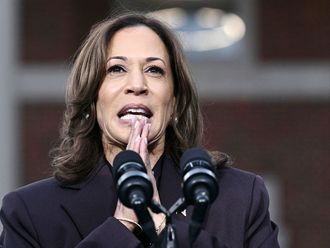
During the Arab Summit in Sirte last March, a five-country group comprising Libya, Qatar, Yemen, Iraq and Egypt was assigned the task of preparing a new vision for the Arab League.
They were mandated to come up with a draft for completely revamping the League's capacities and efficiency. Because of a long record of total Arab inefficiency in follow-ups, few people took that committee seriously — as was clear from the lack of any media attention.
As Arab leaders debated matters related to reforming the League last weekend, at an extraordinary Arab Summit also held in Sirte, it seemed — even if only briefly — that Arabs were finally getting somewhere, albeit slowly.
The leaders assembled in Libya on October 9 debated the development of a system for Joint Arab Action and Arab Neighbours Policy, while Egyptian President Hosni Mubarak talked about "gradual" reform of the Arab League.
The fact that there was no name-calling at the Summit, no surprises from Libyan leader Colonel Muammar Gaddafi, and that 15 Arab leaders actually showed up was in itself an achievement for the League.
The Arab leaders, however, failed to hammer out a solution to the political vacuum in Iraq, failed to come up with solutions to save Lebanon from impending explosion and — worse — failed to do anything concrete for the Palestinians in terms of ending the siege on Gaza or halting the construction of colonies in the West Bank.
They also failed to bridge the gap between Syria and Egypt, which has lasted since 2005. The only real benchmark was a collective decision to give the peace talks between Palestinian President Mahmoud Abbas and Israeli Prime Minister Benjamin Netanyahu a one-month grace period — if the Israelis renew a freeze on colony building in the West Bank.
However, back in March, the Arabs decided that no talks would take place between the Palestinians and Israelis, unless there is a complete halt to colony building — not just a freeze — and unless Israel agrees to a time-frame for these talks and the terms of reference from where they should take off.
They called on the United Nations Security Council to condemn the Judaisation of occupied Jerusalem — there was no follow-up on that matter — and toyed with the idea of taking Israel to the International Court of Justice for crimes committed during its war on Gaza. They called on Unesco to protect the Al Aqsa mosque, given Israel's excavations in occupied East Jerusalem and decided to create a fund of $500 million (Dh1.83 billion) to "rescue [occupied] Jerusalem" and form a committee to document Israeli confiscation of Palestinian lands and homes. All of that went completely down the drain at Sirte last weekend.
After the Arabs wrapped up the first Libya Summit six-months ago, which was coined as a "Palestinian Summit par excellence" Netanyahu snubbed their resolutions by going ahead with plans for 1,600 colony homes in the West Bank and renovating a synagogue next to the Al Aqsa mosque.
The siege of Gaza was not lifted and famously last summer, the Israeli army stormed the Freedom Flotilla headed to Gaza, and killed Turkish civilians onboard. Arabs cried foul — but it was no surprise for the Israelis, who had responded to a 2002 Arab Summit in Beirut by storming Yasser Arafat's compound in Ramallah.
An indifferent Israel
Israel has a habit, after all, of taking action in the immediate aftermath of Arab Summits, to show just how undaunted it is by the decisions of the League of Arab States.
The sad part about this entire ordeal is that Arabs know exactly what they need to do, whether regarding reform of the Arab League or standing up for Palestinians.
Back in the 1940s, when the League was first formed, creative ideas were put forth on how to make it an effective and powerful player in Arab politics. One suggestion was to create an Arab League Army to protect Arabs from outside advances. Another was a mutual defence pact between all Arab states to prevent events like the occupation of Palestine in 1948, the 1990 invasion of Kuwait, or the 2003 war on Iraq.
These ideas should be re-visited, if serious reforms of the League are to be achieved. Besides, there should be a serious commitment to whatever Arabs decide, vis-à-vis the Palestinians. If they cannot help them militarily, the least Arabs can do is follow through with their financial commitments, reached at the numerous summits.
Back in October 2000, an Arab Summit in Cairo allocated $1 billion to preserve Al Aqsa and support the Palestinian Intifada. Most of that money never got through to the Palestinians and the Intifada, on its 10th anniversary, has long been relagted to history. That explains why many doubt that the $500 million of 2010 will ever make it to Gaza and the West Bank.
The Arab Summit scheduled to be held in Baghdad next March will prove whether Arab leaders have indeed decided to tell the world that these summits are not simply a Kodak moment.
Sami Moubayed is editor-in-chief of Forward Magazine in Syria.









